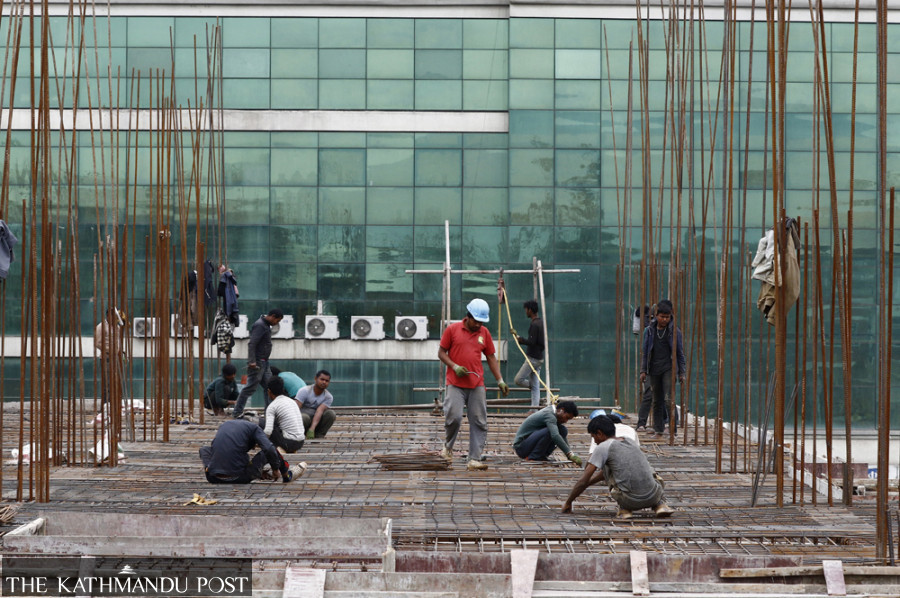National
Planned ‘development law’ to clear hurdles in infrastructure projects
Bill says landowners must accept the compensation agreed on by over 50 percent of affected landowners.
Prithvi Man Shrestha
The government had set 660 milestones to be met in the last fiscal year 2020-21 by the development projects being implemented by various ministries and agencies.
But, according to the Prime Minister’s Office, only 233 or 35.3 percent of the milestones were achieved in that year, suggesting a poor state of implementation of the development projects. These were the goals set for physical infrastructure, energy, urban development, drinking water, communications and reconstruction projects.
For national priority projects, the government fixes certain priorities to be met every year and these are regarded as crucial to ensuring the projects’ completion.
Even among the targets met, just over a half came within their deadline.
But as much as 40.3 percent of those milestones were achieved after the expiry of the deadline while 5.2 percent were reached ahead of the deadline, according to the Annual Report 2020-21 of the Prime Minister’s Office.
This finding of the report, which was prepared based on the Unified Monitoring System of the Prime Minister’s Office, pointed out the continued slow implementation of development projects. In order to address the delay in the implementation of development projects, the government is preparing to introduce a new ‘development law.’
On December 3, Finance Minister Janardan Sharma said the government was working on a ‘development law’ to help accelerate development projects by addressing the difficulties related to land acquisition and environmental clearance, among other things.
“Courts issue stay orders when anyone challenges the implementation process of projects, both big and small,” he said while addressing the silver jubilee function of the Society of Economic Journalists of Nepal (Sejon) last Wednesday.
“It takes years to acquire land and complete an environmental impact assessment. So there is a need for a separate “development law”.
Officials said the government planned to introduce laws to ease implementation of large scale, transformational development projects.
The government in March 2019 had tabled a bill on accelerating the implementation of the nationally prioritised project at the House of Representatives with a provision that the law would apply to projects with an estimated cost of over Rs25 billion each.
The proposed law would also be applicable for the two- or four-lane roads of at least 50 km length, four-lane roads, roads with at least 2km tunnel, international airports, hydropower projects of at least 200MW capacity, railroads of at least 100 km length or railroads with 5km underground tunnel, irrigation projects with the capacity of irrigating at least 20,000 hectares, and drinking water projects with the capacity of pumping 100 million litres of water per day, and any infrastructure projects requiring the use of state-of-the-art technology.
The bill has opened the door for implementing projects under different modalities including design and construction contract; engineering, procurement and construction contract; and engineering procurement, among others.
In an attempt to ease land acquisition for projects, the bill has a new provision that says landowners must agree to the compensation or land price decided by over 50 percent of the landowners whose plots are to be acquired by the project concerned. Project implementation won’t be affected just because a few landowners disagree with the compensation offered to them, the bill says.
Minister Sharma didn’t clarify whether he was talking about the same bill or other laws that the ministry was planning to introduce. Ritesh Shakya, spokesperson for the Finance Ministry, however, said the government was discussing an amendment to the same 2019 bill and presenting it in Parliament.
“As the discussions are in the early stages, nothing has been clear about the amendment,” said Shakya.
The government's move comes at a time when its capital spending has continued to remain poor even after the date of budget presentation was brought forward to Jestha 15 [around May-end] in the constitution promulgated in 2015 to allow the government some time to make preparations for the new fiscal year, which begins mid-July.
According to the Finance Ministry, the capital expenditure in the last fiscal year was 64.7 percent, an improvement from 46.3 percent in the fiscal year 2019-20.
Even though government agencies for the past two years have been blaming the Covid-19 pandemic for the disruption in development activities, the government’s capital spending even in the years prior to the pandemic was not satisfactory.
For example, in the fiscal year 2017-18, the government was able to spend just 66.9 percent of the allocated capital budget and the spending in the fiscal year 2018-19 was 76.9 percent of the total allocation, according to the white paper on the economy released by the Finance Minister in August.
But, experts also have differing views about the need for separate laws to expedite the development projects.
Chandan Sapkota, an economist, said a separate law is needed to help accelerate the implementation of ‘national pride projects’, and transformational and strategic projects.
“There have been talks about introducing such a law targeting big projects for more than five years but nothing has been done yet,” he said, adding that there should also be an institutional mechanism to enforce the law.
Currently, implementation of most of the national pride projects has been moving at a snail’s pace. But the government has also been introducing laws to help accelerate such projects besides fixing the budget presentation date in the constitution itself.
For example, the government introduced Financial Procedures and Fiscal Responsibility Act-2019, which aims to make government officials accountable for poor spending and it has also authorised the government to withdraw the budget from poor performing projects. Preparations are also underway to introduce a new public procurement law. But economist Keshav Acharya says only introducing new laws on development would not address the problems seen in the execution of development projects.
“There is also the risk of the duplication of law and the new law contradicting other existing laws and this can invite further problems,” he said. “My recommendation is that the government should bring one but foolproof law to govern the infrastructure projects sector.”




 16.4°C Kathmandu
16.4°C Kathmandu














